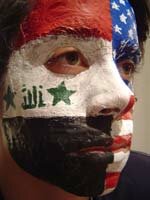22 November 2008
Iraq war loses out to US massacre
1 June 2007
By Belinda Moore: Te Waha Nui Online
 |
| Fifty per cent of US news coverage that week was on the Virginia “massacre”, compared with five per cent on Iraq. |
Two senior New Zealand media editors have responded to criticism over the disparity of media coverage between the Virginia Tech “massacre” and violence in Iraq, saying it’s not a simple case of American lives being considered more valuable than Iraqis.
They say there are a number of reasons why the death of 32 Americans at the hands of a crazed student at Virginia Tech in Blacksburg received more coverage than the nearly 200 Iraqi deaths that occurred the following day in Baghdad.
Statistics released by an online media watchdog, Project for Excellence in Journalism, show that in the week of the killings, the Virginia “massacre” accounted for over 50 per cent of American news coverage.
In comparison, the horrific attacks in Iraq only occupied five per cent of coverage.
Liberal media critics are upset with this discrepancy in coverage, which they say reflects the hierarchical worth media place on people’s lives.
But the New Zealand editors say the issue is more complex than simply valuing one person’s life over another’s.
“I think there is a price on life but...I think it’s wrongly assumed that that’s a wrong thing,” says New Zealand Herald assistant editor Jeremy Rees.
“Because of geographical proximity, or cultural interests, we value life in some areas more than others,” says Rees. “I don’t think there’s any doubt about that.”
What needs to be understood, Rees says, is that “if the definition of news is what happened today that didn’t happen yesterday,” then it is difficult for Iraq to stand up against the shock value of the Virginia “massacre”.
“Possibly wrongly, it’s much easier to understand a lone nutter than the incredible complexities of Iraq at the moment,” says Rees.
One News producer Tony Davenport agrees. “Daily there are 50 people dead in Iraq and the pictures are always the same. It gets very, very repetitive.”
Both Davenport and Rees say that issues of access for journalists in Iraq, particularly the inherent danger for Westerners there, hinder the coverage available to editors.
In contrast, they considered the Virginia “massacre” story more newsworthy because it allowed for personal stories and a human interest angle.
Rees says the internet also played a distinct role in the increased Virginia coverage because students could post their own personal accounts before media even arrived.
“There is a human instinct towards different life having different levels of interest. I don’t think it’s exclusively nasty to New Zealanders or white journalists.”


